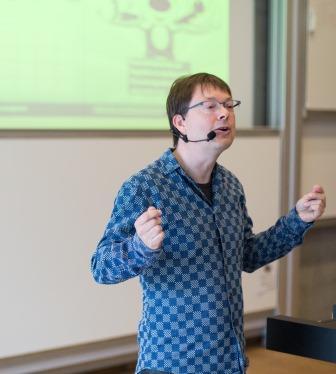Handling resistance through ludic technologies in the frame of a cartoon state - keynote speak by Niels Å. Andersen at OBHC14
Keynote speak by Niels Åkerstrøm Andersen at OBHC14

By the title ‘Who is Yum-Yum? Handling resistance through ludic technologies in the frame of a cartoon state’ Professor and cluster facilitator at the Public-Private cluster of Shifting Forms of Public Governance Niels Åkerstrøm Andersen today gave a keynote speak at this year’s #OBHC14 'Organisational Behaviour in Healthcare Conference'.
In a conference room with no empty chairs left Andersen elaborated on how playful approaches and the use of games in the steering of health work as a way for the state to achieve instrumental goals and to empower people to improve their own health.
Taking point of departure in the meeting with Yum-Yum’, a campaign by the Danish Veterinary and Food Administration and the National Board of Health focusing on how to obtain more healthy Citizens through play, Niels Åkerstrøm Andersen spoke at OBHC14 about how the public system tries not to look like a system as many (employees) are attentive to the barrier that may be present with socially exposed citizens in form of a general scepticism and antipathy towards everything that they associate with the public system..
By using playful dialogue that doesn’t seem as ‘true dialogue’, citizens feel they are playing with the system – change in behaviour then doesn’t feel like 'control' – as it is only play. This build to the argument, that health promotion cannot look like health promotion. Andersen stresses how ludic technologies can be seen as a response to resistance and to enhance the function of ‘active citizenship’. By arguing that the state installs what can be seen as collective contacts – contracts that is contracts but doesn’t seem like contracts, Andersen argued that you strengthen the obligation of self-regulation even when you can’t force it. In this understanding the public sector as a system tries not to look like a system – it takes the role of a cartoon, as fun and playful.
Andersen’s presentation held the following theses:
-With the concept of ‘active citizenship’ the public administration expands its steering ambitions regarding the inner will and self-creation of the individual citizen
- The administration experience resistance among citizens. They lack the will of steering their inner will in the name of public administration.
- Ludic technologies are a way of handling this resistance.
- And this type of steering technology put at stake the form of state

The meeting with ‘Yum Yum’ resulted in inspirering chuckles here and there amongst the audience. who in the debate afterwards paid great interest to how especially the Danish, and Scandinavian, Welfare system succeed with these kinds of initiatives. One of the participants asked if it really is possible to make necessary changes through this sort of voluntary play – and if it could work in countries with more severe problems? As a reply Andersen talked of the logic of games as the understanding, that in games you forget yourself – making it feel easier to ‘engage’ in the public system.
Download the presentation with much more details here:niels_aakerstroems_praesentation_who_is_yum-yum_obhc14.pdf
And meet Niels Åkerstrøm Andersen here.
Next week we will be back with a more collective news story on the conference.